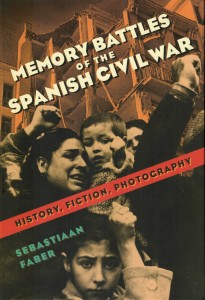Book Review: Memory Battles of the Spanish Civil War
 Sebastiaan Faber, Memory Battles of the Spanish Civil War: History, Fiction, Photography. Nashville: Vanderbilt University Press, 2018. 241 pp.
Sebastiaan Faber, Memory Battles of the Spanish Civil War: History, Fiction, Photography. Nashville: Vanderbilt University Press, 2018. 241 pp.
Reviewed by Joshua Goode
Sebastiaan Faber’s new book, Memory Battles of the Spanish Civil War: History Fiction, Photography, has two missions. First, he charts the complicated and multisided ways in which history and the memory of the Spanish Civil War both drive and are driven by contemporary politics. Not surprisingly, Faber concludes like most who study history and memory: history is a very presentist concern. When we confront the past we invariably read our current conflicts and interests into it. Yet Faber has another purpose for his study which is equally engaging, far less common and especially relevant: to ruminate on and to place at the center of debates about history and memory the role of the university scholar in these public debates. Either digging up the bones, passing laws that force historical memory, or writing books, films or poems that subtly confront the past, Faber wants to find the place for the scholar to be a public intellectual, to enliven and roil public interests. For this reason alone, Faber’s work would be of great interest to the readers of The Volunteer.
Part of the reason the work is effective is the multiple contexts that Faber examines. He divides the book into five parts, each unpacking memory fights in their discrete and separate formats and modes of expression. Part one looks at the “visual archive” of the Civil War and the novelty of photographic propaganda that still serves as a lasting artifact of the war. In one particularly memorable section, Faber leads us through his own detective story tracking down the ways that some of the most iconic posters and photos from the war were assembled, repurposed and then lived on as symbolic palimpsests of the war and its meanings.
Part two probes witness testimony and its role in framing public and interpersonal debates in the post-Franco era as well as in the legal wrangling with the crimes committed during the war, including the treatment of Baltazar Garzón and the passage of the Law of Historical Memory in 2007. Part three includes a fascinating conversation among historians in Spain, the United States and England, each ruminating on the political stakes of Spain’s memory battles not just for participants and their offspring but also for the professionals for whom writing about the Spanish past is their job. Part four looks at the same topics but from the perspective of other intellectuals, writers, film makers and poets. Part five examines fiction writers in particular, who were among the first to confront the Civil War during the Franco years and in the post-Franco era when silence was supposed to be the primary mode of dealing with the war.
Each section puzzles over the disparate ways that the confrontation with past both affects and is affected by present-day circumstances. One cannot appreciate contemporary Spanish politics without accounting for the ways in which memory, personal and collective, trouble ongoing social and political debate. Yet the book has another purpose and one that is as finely rendered. As a university professor himself but one who works and writes for the larger public, Faber advocates for the role of the scholar to help guide, coax, complicate and advance public debate. In this regard, his book is a defense of the humanities scholar and a paean to the value that humanistic studies play in our world. He writes in his introduction: “For those of us who engage with Spain through scholarship, even from abroad, these developments [a more volatile but diverse political landscape in today’s Spain] have also created an opportunity—if not an obligation—to re-examine some of the assumptions underlying our work. In fact, they may even compel us to question the very institutional foundations of our practice as scholars of the humanities. This book is meant as a strong nudge in that direction.” This nudge should be a welcome burden for a scholarly work. Faber’s accomplishment rests as much in engaging in the effort as in his ability to fulfill it.
Joshua Goode is the book review editor for The Volunteer.












